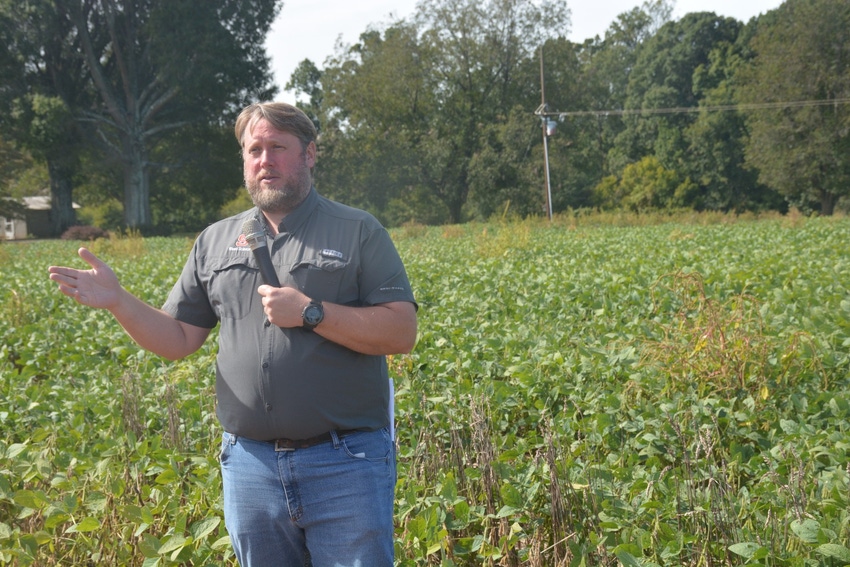
The herbicide resistance weed issue isn’t going away anytime soon, which is why North Carolina State University is looking beyond chemicals to manage such troublesome weeds as Palmer amaranth, Italian ryegrass and waterhemp. One technology that holds promise is harvest weed seed control.
Speaking at the Piedmont Soybean Field Day Sept. 28 at the Piedmont Research Station in Salisbury, North Carolina State University Extension Weed Specialist Wes Everman gave a status report on herbicide resistance in soybeans and small grains across the Tar Heel State.
“There is a lot of resistant Palmer in this state. It is moving into this part of the state a little more regularly,” Everman said of North Carolina’s Piedmont region.
Everman noted that Palmer amaranth resistance to glyphosate, ALS, PPO, HPPD and atrazine has been confirmed in North Carolina. He pointed out that a graduate student has confirmed Group 15 resistance in Palmer amaranth while another graduate student has confirmed Liberty resistant Palmer amaranth in the state.
Liberty and Group 15 resistant Palmer and waterhemp has been confirmed in other states while dicamba resistant Palmer has been confirmed in West Tennessee. Other states are reporting 2,4-D resistance in Palmer amaranth.
“We should be aware of some of the challenges with Palmer. We’ve also confirmed five-way resistant waterhemp in the Piedmont. It’s farther north of here, but it has spread to several different locations. There are eight or nine unique spots where it has been introduced. Most of the time it’s coming on equipment. You have to make sure you’re cleaning up your equipment well, especially if you have a piece of equipment that is new to you,” Everman said.
Italian ryegrass resistance in wheat is also occurring in the southern Piedmont. Everman says another graduate student has confirmed resistance to glyphosate, ALS, ACCase, paraquat and Liberty herbicides. “That is five-way resistant ryegrass you cannot kill once it comes up.”
“We’re trying to come up with solutions to these problems. There are not a lot of new chemicals coming our way. The question is what do we do? We’re looking at cover crops. We can use residuals with cover crops. We can switch things up to try to change that emergence pattern and give our crop a competitive ability,” Everman said.
Everman is hopeful about the potential of harvest weed seed control where you basically manage the weed seeds at harvest to keep them from returning to the soil seedbank and becoming a problem in the future. North Carolina State is conducting cooperative research with other universities examining harvest weed seed control.
“If we can keep those seeds from going back to the soil, we deplete that population of weeds in that field year on year,” Everman explained.
At North Carolina State, research has begun looking at different harvest weed seed control methods. Everman and his colleagues are examining chaff lining, chaff carts, and combine-mounted HWSC units as options to remove or reduce seed at harvest.
Everman encourages farmers who want to learn more about harvest weed seed control tactics to access the GROW (Getting Rid of Weeds) website at https://growiwm.org/.
About the Author(s)
You May Also Like






